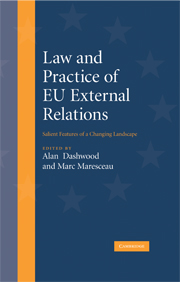Book contents
- Frontmatter
- Contents
- Abbreviations
- Notes on contributors
- Acknowledgements
- Introduction
- PART I Constitutional and institutional questions
- 1 Direct effect and interpretation of international agreements in the recent case law of the European Court of Justice
- 2 Defining competence in EU external relations: lessons from the Treaty reform process
- 3 Article 47 TEU and the relationship between first and second pillar competences
- 4 EC law and UN Security Council Resolutions – in search of the right fit
- 5 Fundamental rights and the interface between second and third pillar
- 6 The EU as a party to international agreements: shared competences, mixed responsibilities
- 7 The Common Commercial Policy enhanced by the Reform Treaty of Lisbon?
- 8 The extent to which the EC legislature takes account of WTO obligations: jousting lessons from the European Parliament
- PART II Bilateral and regional approaches
- PART III Selected substantive areas
- Table of Treaty Provisions
- Index
3 - Article 47 TEU and the relationship between first and second pillar competences
from PART I - Constitutional and institutional questions
Published online by Cambridge University Press: 07 September 2009
- Frontmatter
- Contents
- Abbreviations
- Notes on contributors
- Acknowledgements
- Introduction
- PART I Constitutional and institutional questions
- 1 Direct effect and interpretation of international agreements in the recent case law of the European Court of Justice
- 2 Defining competence in EU external relations: lessons from the Treaty reform process
- 3 Article 47 TEU and the relationship between first and second pillar competences
- 4 EC law and UN Security Council Resolutions – in search of the right fit
- 5 Fundamental rights and the interface between second and third pillar
- 6 The EU as a party to international agreements: shared competences, mixed responsibilities
- 7 The Common Commercial Policy enhanced by the Reform Treaty of Lisbon?
- 8 The extent to which the EC legislature takes account of WTO obligations: jousting lessons from the European Parliament
- PART II Bilateral and regional approaches
- PART III Selected substantive areas
- Table of Treaty Provisions
- Index
Summary
Introduction
Since the Treaty of Maastricht, the external action of the European Union(EU) has been conducted under the distinct sets of constitutional arrangements found respectively in the EC Treaty (the first pillar) and in Title V and Title VI of the TEU (the second and third pillars). This chapter is more particularly concerned with the relationship between the Union's first pillar competences, exercised through the persona of the European Community (EC) and extending to those fields of external activity for which legal bases exist in the EC Treaty, and its directly exercisable second pillar competence in the field of the Common Foreign and Security Policy (CFSP).
Central to the management of that relationship (as well as of the relationship between first and third pillar competences) is Article 47 of the TEU, found among the Final Provisions in Title VIII of that Treaty. The Article states:
Subject to the provisions amending the Treaty establishing the European Community, the Treaty establishing the European Coal and Steel Community and the Treaty establishing the European Atomic Energy Community, and to these final provisions, nothing in this Treaty shall affect the Treaties establishing the European Communities or the subsequent Treaties and Acts modifying or supplementing them.
Evidently, the function of Article 47 is to preserve the integrity of the legal order that was brought into being by the EC Treaty, in the face of the new competences conferred upon the Union by the TEU.
Information
- Type
- Chapter
- Information
- Law and Practice of EU External RelationsSalient Features of a Changing Landscape, pp. 70 - 103Publisher: Cambridge University PressPrint publication year: 2008
Accessibility standard: Unknown
Why this information is here
This section outlines the accessibility features of this content - including support for screen readers, full keyboard navigation and high-contrast display options. This may not be relevant for you.Accessibility Information
- 11
- Cited by
